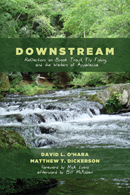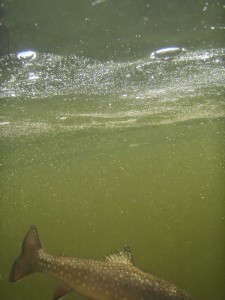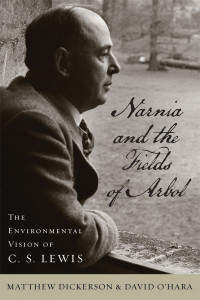
Over the past several years via the Emerging Scholars Network I’ve gotten to know David L. O’Hara, Ph.D. (Associate Professor of Philosophy and Classics, Augustana College, South Dakota). I particularly appreciate the refreshing manner in which he addresses material on his blog Slowly Percolating Forms. After the release of his new Wipf and Stock publication, Downstream: Reflections on Brook Trout, Fly-Fishing, and the Waters of Appalachia (co-authored with Matthew Dickerson, Ph.D., Computer Science Professor, Middlebury College), I dropped him a line to see if he’d be willing to share about Downstream with the Emerging Scholars Network. No doubt it was special timing that both David and Matthew were able to respond with the new term so close at hand. I encourage you to sit back and enjoy the conversation around the virtual media table. Tom: Dear David and Matthew, Thank-you for taking the time to join us on the Emerging Scholars Network blog. Please begin by sharing with our readers the story behind Downstream: Reflections on Brook Trout, Fly-Fishing, and the Waters of Appalachia.
DAVID: My friend, Professor Matthew Dickerson (Middlebury College) and I spent the better part of six years researching and writing about brook trout throughout the Appalachians from Maine to Georgia. Several impulses drove us on: first, we love brook trout and the places they live. We wanted to get to know the fish and their native waters better, and to do what we could to help our communities to care for those places. Second, all of our writing together (this is our third co-authored book) is the product of an enduring friendship.
MATTHEW: I would add both that I think this book is stronger because the collaborative effort that came out of our friendship, but also that our friendship is stronger because of our work together on this book (and other collaborations.) We brought to this book, and we bring to our friendship, some similar loves and passions (for creation care, for careful thinking, for good writing and especially the faith we hold in common), but also some different gifts and perspectives and backgrounds.
Tom: What a joy to read of your collaboration. Please give us a glimpse into your intended audience and how you settled on the format of the publication in order to best serve the reader.
DAVID: Our book is informed by our disciplines, but we wanted to write for ordinary people. We spent a good deal of time doing research both in the field and in libraries, but we wanted to make sure we translated that research into terms that would make sense to ordinary people. On the surface, it’s a book about trout and fly-fishing, and I imagine that the majority of people who buy it will be people who are interested in those things, or who have friends who care about them. But we have written narratively, and we talk about much, much more than fishing for trout. Fly-fishing happens to be our point of initial contact with these waters, and it is an important mode of knowing nature, but it is not the last or only point of contact. Everyone is affected by the waters they live near. We all live downstream, in a sense. Brook trout are an iconic species that is also very sensitive to environmental change, a sort of canary-in-the-coal-mine. For us, getting to know one species has been a way to get to know their habitat and other species that are connected to them. In a way, researching trout has led us back to the human environment, and to questions about how we live, and why.
MATTHEW: I agree with Dave, and would add also that this book tells quite a bit of our own stories and how our ideas have been shaped. I don’t think you would need to love fishing to enjoy this book any more than you would need to be a detective to enjoy a mystery story. One struggle we did have was finding the right voice for a collaborative project. We initially tried to write the book with a single unified voice that simultaneously represented us both, but it felt awkward. We settled on keeping separated written chapters that I think present both our separated voices and yet provide a sort of unified voice through the book as a whole.

Tom: I like the idea of separate chapters and am looking forward to reading the dialogue. I confess it’s fun to have a glimpse of it on this post and also via the excerpt posted by Dave Tabler on AppalachianHistory.net. Getting back to the big picture, what three or four points do you desire every reader to take away from Downstream?
DAVID: We touch on some questions that I think a lot of people will find relevant or interesting. Is it ethical to fish when we can get food from the grocery store? How do we pass on important traditions? How are we all affected by dams? Who owns nature? What are the costs and benefits of new highways? We have written narratively and geographically, so the book travels through and discusses many of the Appalachian states. This means that people who know or live in the Appalachians will find familiar places in the book and might come to see those places through new eyes. In the end, though, what we most want is to bear witness to what we have seen, hopefully in a way that will help others to be better inhabitants and stewards of the world we’ve been given.
MATTHEW: I think my own writing and thinking on nature—on the physical created cosmos—has revealed to me at least the important contrasts between two competing world views. C.S.Lewis describes them his book The Abolition of Man, and Wendell Berry contrasts then more poetically in a beautiful essay “A Native Hill.” One worldview sees the cosmos has having an ultimate meaning and purpose, and humans should be conforming our souls (our thoughts and our practices) to that Reality. Another worldview sees the cosmos as mere material to be conformed to our desires, which we do by gaining power. The former of these is the one I believe to be consistent with my Christian faith and the one I think to be true and that I want to live by. That is a very abstract way of putting of course, in the context of philosophical and theological ideas. I didn’t write the book with the intent of preaching those ideas, or even explicitly conveying them. But those ideas do greatly inform my thinking, and I hope also my writing.
Tom: To dig into the topic a little bit deeper, how did your faith in Christ and theology of vocation influence your writing of Downstream? In addition to what has been mentioned previously, were there particular publications which influenced your writing?
DAVID: When I am in the mountains, or in the forest, standing in a vast prairie field or waist-deep in flowing water I find myself filled with gratitude and awe. These are beautiful places we’ve been given. Some of the Psalms have language like this, language that helps to express this feeling of delight and wonder in the natural world. A gift like this seems to call for a certain kind of response, the response of a grateful person who regards the gift as a sign of love. I don’t worship nature, but I think that caring for the world is a way of honoring the giver.
MATTHEW: I concur fully with David. Psalm 104 has also profoundly shaped my thinking, and the idea that God has created so much that is good in and of itself, and not merely for its utility to humans. I think of God delighting in sea monsters frolicking in the deep, or of a shepherd giving thanks that God cares for lions. I believe we are intended to delight. Delight is a great expression of what it means to be God’s image-bearing creatures. We are to delight in God, and also by delighting in God—or as a means toward delighting in God—we are also to delight in what God has made. But I also took this question in a slightly different way, which is not merely how my faith and theology impacted the way I wrote this book and my attitudes when writing, but how my faith impacted the very decision to write a book like this in the first place. (The book does not fall even remotely into the framework of my professional academic career at the college where I teach.) I will say only that I think my call is to write books that I can write well and that ought to be written, rather than to write the books that will further my academic or scholarly career. To wrap up, please share with Emerging Scholars an encouragement regarding the value of their role in the Kingdom God and next steps in being “little Christs” on campus and beyond.
Tom: To wrap up, please share with Emerging Scholars an encouragement regarding the value of their role in the Kingdom of God and next steps in being “little Christs” on campus and beyond.
DAVID: This book is the product of friendship with Matt and delight in the world we’ve been given. It’s a reflection on our traditions and on those who will come after us. In the end, it’s a reflection of the things Matt and I find deeply rooted in our lives and hearts. It’s okay to research and write about such things! In fact, it is delightful and worthwhile to do so.

MATTHEW: I answered the previous question before I read this one, or read Dave’s reply. I simply say “amen” to what Dave wrote, and also refer back to my previous answer.
And it’s hard for me not to likewise add an “Amen!” and one more “Thank-you!” to David and Matthew for offering their shared story of Downstream: Reflections on Brook Trout, Fly-Fishing, and the Waters of Appalachia to a wider community. Maybe as we assemble our Christmas lists we can interview them again regarding their two previous collaborative endeavors:
- From Homer To Harry Potter: On Myth and Religion (Brazos, 2006)
- Narnia and the Fields of Arbol: C.S. Lewis’ Environmental Vision (University Press of Kentucky, 2009).
Tom enjoys daily conversations regarding living out the Biblical Story with his wife Theresa and their four girls, around the block, at Elizabethtown Brethren in Christ Church (where he teaches adult electives and co-leads a small group), among healthcare professionals as the Northeast Regional Director for the Christian Medical & Dental Associations (CMDA), and in higher ed as a volunteer with the Emerging Scholars Network (ESN). For a number of years, the Christian Medical Society / CMDA at Penn State College of Medicine was the hub of his ministry with CMDA. Note: Tom served with InterVarsity Christian Fellowship / USA for 20+ years, including 6+ years as the Associate Director of ESN. He has written for the ESN blog from its launch in August 2008. He has studied Biology (B.S.), Higher Education (M.A.), Spiritual Direction (Certificate), Spiritual Formation (M.A.R.), Ministry to Emerging Generations (D.Min.). To God be the glory!

Leave a Reply